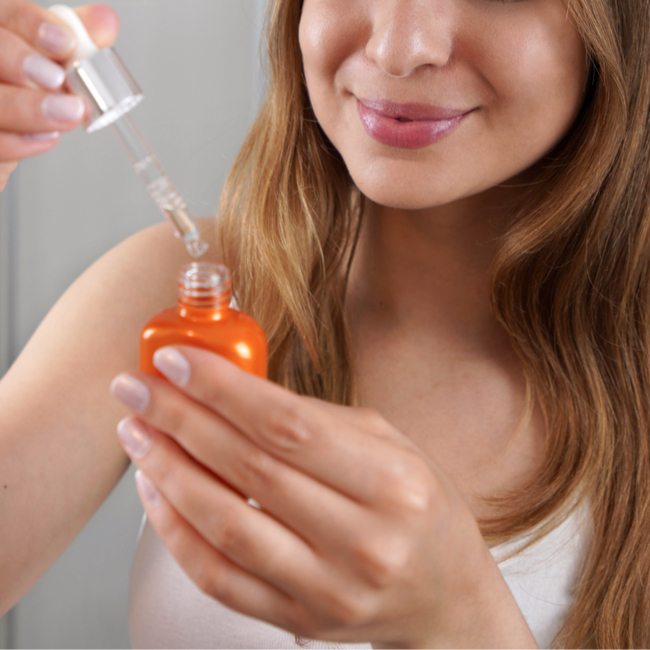
1. Start Off Your Day With Vitamin C & Sunscreen
Having a consistent morning routine that also protects your skin from harmful UV rays is key, Casey explains. “Morning skincare habits should take into account the circadian rhythm of the skin,” she says.
In the morning, the skin has completed its rest and repair phase, which occurs overnight. Skin permeability is less in the morning compared to the evening, and blood flow to the skin slows. “Penetration of hydrophilic and lipophilic compounds peaks in the early morning hours,” she adds, “all of these factors should be taken into consideration as we address morning skincare.”
With that said, Casey stresses the following morning steps over 30 or at any age as “prevention is truly the best medicine when it comes to your skin health.” Start with a pH-balanced, gentle cleanser designed for your skin type (dry, oily or combination), then she says to use a vitamin C serum and to apply moisturizer and sunscreen before applying makeup or leaving the house.
"Apply an antioxidant serum, such as vitamin C. Antioxidants are an important morning skincare step as they ‘arm’ your skin to be prepared for all of the environmental pollutants and irritants that we encounter throughout the day,” she says, adding to think of antioxidant serums as an extra layer of protection on your skin.
Next, “apply an effective moisturizer, which helps lock in the antioxidant serum and well and seals the skin barrier, offering protection and hydration to the skin.” Then, remember that “sunscreen is non-negotiable,” and choose one that is “SPF 30 or higher and offers broad-spectrum UVA/UVB protection.”
2. Get Ready For Bed With Hyaluronic Acid Serum & Moisturizer
Just as crucial as a morning routine is for healthy aging skin, a nightly skincare regimen offers plenty of benefits when practiced consistently. In any great nighttime routine, Kung says using hyaluronic acid with a hydrating moisturizer before hitting the sheets can provide essential moisture to your skin (which can help prevent or delay the formation of more wrinkles over time).
“Hyaluronic acid serum helps draw in moisture, plump up our skin, and protect skin barrier function,” she says. Personally, Kung notes that she thinks of skincare simply, and a tried-and-true way to “protect” your healthy current skin is to “use one product after cleanser and before moisturizer [hyaluronic acid serum] to take care of all your skincare concerns— discoloration, fine lines and wrinkles, and skin barrier repair.”
Cleansing with a gentle pH-balanced cleanser, then adding hyaluronic acid and finally, a nighttime moisturizer can make all the difference, especially when also practiced with the morning routine described above.
Hsu agrees, and says that hyaluronic acid is “a naturally occurring substance that keeps our skin plump and youthful” and that the serum you choose should be “formulated with both high and low molecular weight.” Hyaluronic acid works best, he says, by “absorbing and holding onto water, so it is imperative that it is applied to damp skin.” This would then be followed by a hydrating moisturizer for even more support.
3. Supplement With Collagen
Collagen is the protein linked to skin elasticity and healthy joints, and as we age, our body produces less of it. In order to help the body improve the skin’s stretchiness, many people seek a collagen-boosting supplement to promote further production of the protein (and prevent earlier wrinkling).
Jaliman recommends taking a daily collagen supplement with the recommended dose of 6000 mg, up to 6 tablets daily. “Collagen peptide consumption can increase skin elasticity and can help your body’s skin repair process, thus encouraging your body to form new collagen,” says Jaliman.
She also notes that “mixing collagen powder with water” can deliver these effects. “Water is preferred as you want to avoid sugary drinks,” Jaliman says. “Drink at least 7-8 glasses of water per day as drinking water increases blood flow in the skin and body.”
If you’re experiencing dry, patchy, wrinkling skin and “feel thirsty,” she advises that this is your body “asking for” water. “Our cells and tissues are made up of mostly water,” she adds. “It’s important to stay hydrated.”
4. Exercise Regularly
While exercise is often hailed as a magic medicine for any ailment or issue (including lack of energy, fatigue, weight loss, maintaining weight, etc) it also unsurprisingly offers benefits for healthily aging skin. “Exercise can help if you make it part of your daily routine,” says Jaliman. “Exercise helps increase our blood flow, which then helps to nourish skin cells.”
She adds that “research studies show that when you exercise it makes your skin look younger. Jaliman also explains that exercise stimulates substances called “myokines, specifically I L-15,” which increases the thickness of the deeper layers of the skin and decreases the thickness of the outer layers of the skin.
Good to know!


